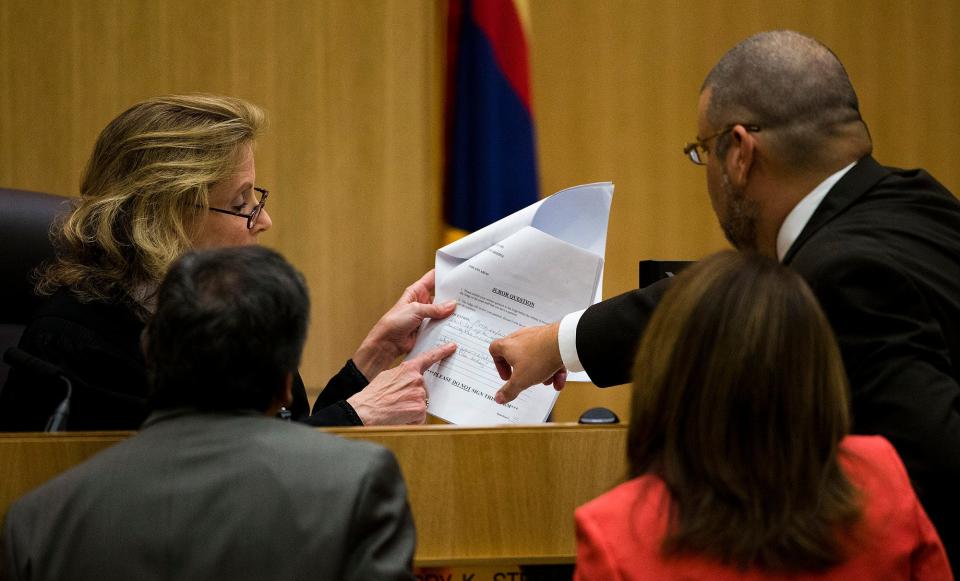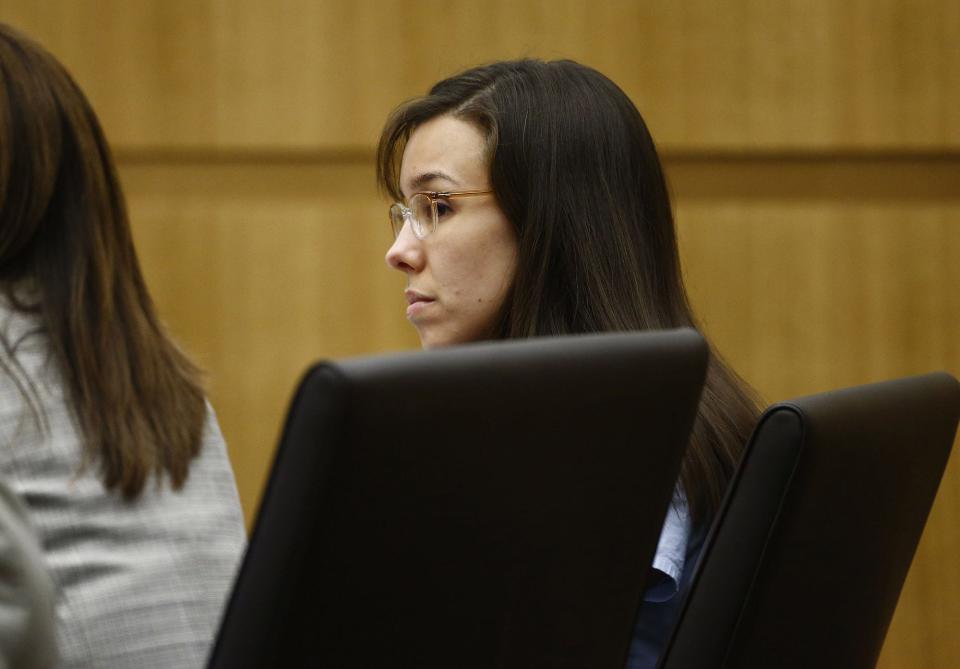Abuse of power, sex, disbarment: What happened to key players in the Jodi Arias murder trial
It was a case that riveted the nation, was an international sensation, and put Arizona's Maricopa County Superior Court under an intense spotlight.
The prosecution of Jodi Arias for the murder of her boyfriend Travis Alexander forged and destroyed reputations. Books, movies and careers were made. It was one of the biggest show trials since the acquittal of football legend O.J. Simpson.
On May 8, 2013, a jury on the fifth floor in the South Tower of the county court complex declared Arias guilty of first-degree murder. In the 10 years since, fates have been mixed for the key players in the saga.
The victim and his family: Travis Alexander
Alexander was a salesman and an aspiring motivational speaker who was in an on-again, off-again relationship with Arias for nearly two years. Originally from Riverside, Calif., Alexander moved to Mesa for business opportunities several years before his death while also hoping to build a life within a strong Mormon community.
Alexander's family has not spoken much publically in the decade since Arias' trial, however, a book titled "Our Friend Travis: The Travis Alexander Story" was published in 2015 by two of Alexander's "good friends."
Fans who were anti-Arias and supported Alexander have still shown support online for his life throughout the years with Facebook pages such as "Justice for Travis Alexander" and a multitude of podcast episodes on the murder.
The murder defendant: Jodi Arias
Now 42, Arias is serving a life sentence in the Perryville state women's prison in Goodyear. She is not eligible for release.
According to state prison system records, Arias has been found guilty of only one minor misconduct charge while in custody for disrespecting staff. She was reclassified to a low-security wing of the prison in 2021. She works in the prison library.
In 2020, the Arizona Court of Appeals rejected Arias' appeal of her conviction and sentence.
A look back: 10 years ago, Jodi Arias' sensational trial ended in a murder conviction in Arizona
The lead prosecutor: Juan Martinez
County prosecutor Juan Martinez became a cult favorite during the trial. He threw evidence in the courtroom for effect, let emotions of near rage overtake him, and signed autographs and took pictures with "fans" outside court. Those fans called him "Juantastico." His detractors, troubled by a string of allegations of ethical breaches and prosecutorial misconduct allegations, called him "Teflon Juan."
Those caught up to him in 2020. Martinez agreed to end his 30-year career as a prosecutor and be disbarred because of Arizona State Bar complaints against him. The complaints involved allegations that Martinez sexually harassed women he worked with at the Maricopa County Attorney's Office.
The Bar also accused him of leaking information to a blogger during the Arias trial and lying to investigators about having a sexual relationship with her. Martinez agreed to his disbarment, but only by declining to defend the charges against him. He did not admit to misconduct.

The judge: Sherry Stephens
In Arias' sentencing retrial, Stephens blocked media and public access during witness testimony, because the witness would not testify unless the courtroom was closed. The Arizona Republic, a member of the USA TODAY Network, and 12 News sued for access and took the matter to the Arizona Court of Appeals, who ended up siding with the media. One of the witnesses that testified in secret was Arias, who said she wanted to testify behind closed doors because of death threats she received.
Judge Sherry Stephens announced her retirement in 2021. Stephens ultimately was the one who sentenced Arias to life without the possibility of release after a second jury could not decide on Arias' punishment.
Timeline: A look back at the Jodi Arias murder case
The first county attorney: Andrew Thomas
Andrew Thomas was the Maricopa County attorney when Arias murdered Alexander in 2008. He led the Maricopa County Attorney's Office when it launched the prosecution of Arias and sought the death penalty, controversially because Arias claimed she acted in self-defense to escape an abusive relationship.
In 2010, Thomas resigned to run, unsuccessfully, for Arizona attorney general. Thomas was disbarred for numerous ethics violations in April 2012. Those violations were in his capacity as Maricopa County Attorney and included conflicts of interest, dishonesty, misrepresentation and abuse of power for filing charges against county officials with the sole purpose of embarrassing or burdening them.

The second county attorney: Bill Montgomery
Bill Montgomery was elected Maricopa County attorney in November 2010 after Thomas resigned. He was widely questioned for his decision to continue seeking the death penalty for Arias after the spectacle and cost of the first attempt.
In September 2019, Montgomery was appointed to the Arizona Supreme Court by Gov. Doug Ducey. During his confirmation and vetting process, Montgomery was forced to defend his refusal to discipline Martinez, the flamboyant prosecutor, and allowing him write a book about the Arias case.
The media commentator: Nancy Grace
The former prosecutor turned CNN crime show host covered the case extensively with CNN Headline News. The network built a set of a fake courtroom in downtown Phoenix, where the public could watch the trial streamed live from the real courtroom. Nancy Grace polled faux jurors after key days of courtroom drama. She was widely criticized for her sensationalist coverage.
In 2019, Grace left CNN to be part of the Fox network’s streaming. She now has a daily podcast, "Crime Stories with Nancy Grace" through Fox Nation.
The defense attorneys: Laurence Nurmi and Jennifer Willmott
Laurence "Kirk" Nurmi led Arias' defense team with Jennifer Willmott by his side. In 2016, Nurmi was disbarred on allegations of an ethical breach for writing a book about the case. Willmott is still a practicing defense attorney in Maricopa County.
Willmott was on the defense team for Machelle Hobson, a Maricopa mother who was accused of neglecting her seven adopted children who she featured in a popular YouTube series, "Fantastic Adventures." However, Hobson died of natural causes before she could stand trial. She was accused of beating, starving, and pepper-spraying the children if she felt their performances on the channel were inadequate.
The courtroom blogger: Jennifer Wood
Jennifer Wood, a stay-at-home mom and her friend Sharee Ruiz, ran a blog called The Trial Divas. On it, the pair blogged about prominent murder cases, gained a following, and turned it into a business. Shortly after meeting in August 2013, Wood and prosecutor Juan Martinez began an affair.
During the trial, Wood began Jen's Trial Diaries after Ruiz left because of the affair. It is still active on social media. During Arias' resentencing phase, Martinez allegedly told Wood the name of a juror he wanted dismissed because they were against the death penalty. Juror identities are supposed to be protected, but Martinez denied the allegation.
This article originally appeared on USA TODAY NETWORK: Here's what happened to the key players in the Jodi Arias murder trial

